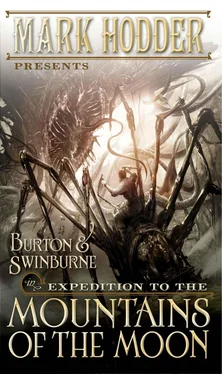Mark Hodder - Expedition to the Mountains of the Moon
Здесь есть возможность читать онлайн «Mark Hodder - Expedition to the Mountains of the Moon» весь текст электронной книги совершенно бесплатно (целиком полную версию без сокращений). В некоторых случаях можно слушать аудио, скачать через торрент в формате fb2 и присутствует краткое содержание. Жанр: sf_stimpank, на английском языке. Описание произведения, (предисловие) а так же отзывы посетителей доступны на портале библиотеки ЛибКат.
- Название:Expedition to the Mountains of the Moon
- Автор:
- Жанр:
- Год:неизвестен
- ISBN:нет данных
- Рейтинг книги:5 / 5. Голосов: 1
-
Избранное:Добавить в избранное
- Отзывы:
-
Ваша оценка:
- 100
- 1
- 2
- 3
- 4
- 5
Expedition to the Mountains of the Moon: краткое содержание, описание и аннотация
Предлагаем к чтению аннотацию, описание, краткое содержание или предисловие (зависит от того, что написал сам автор книги «Expedition to the Mountains of the Moon»). Если вы не нашли необходимую информацию о книге — напишите в комментариях, мы постараемся отыскать её.
Expedition to the Mountains of the Moon — читать онлайн бесплатно полную книгу (весь текст) целиком
Ниже представлен текст книги, разбитый по страницам. Система сохранения места последней прочитанной страницы, позволяет с удобством читать онлайн бесплатно книгу «Expedition to the Mountains of the Moon», без необходимости каждый раз заново искать на чём Вы остановились. Поставьте закладку, и сможете в любой момент перейти на страницу, на которой закончили чтение.
Интервал:
Закладка:
“Now that you have your bearings, gentlemen, I shall take my leave of you,” the doctor said as they reached a staircase at the prow of the vessel. “There is much to be done before our principal voyage begins, as I'm sure you appreciate.” He looked down at Swinburne. “I have to pass back through the lounge, sir. If you'd care to accompany me, I'll organise that breakfast tipple for you.”
“Bravo!” Swinburne cheered. “That'll be just the ticket!”
“And you, sir?” Quaint asked Burton.
“Too early for me. I'll retire to my quarters to go over the expedition inventory.”
“Then I shall see you at lunch, sir.”
The top ends of four colossal copper rods poked out of the dense fog that blanketed London. Guided by Francis Wenham, HMA Orpheus slid into position between them and gently descended into the central courtyard of Battersea Power Station.
It was two o'clock in the afternoon.
“How times have changed,” Swinburne commented as he and Sir Richard Francis Burton disembarked, wrapped tightly in their overcoats, top hats pressed onto their heads. “Who'd have thought, a couple of years ago, that we'd end up working with Isambard Kingdom Brunel?”
“How times have changed,” Burton echoed. “That's the problem.”
Herbert Spencer, the clockwork philosopher, emerged from the pall to greet them.
He was a figure of polished brass, a machine, standing about five-feet-five-inches tall. His head was canister-shaped, with a bizarre-looking domed attachment on top of it that was somewhat reminiscent of a tiny church organ. The “face” beneath it was nothing more than three raised circular areas set vertically. The topmost resembled a tiny ship's porthole, through which a great many minuscule cogwheels could be glimpsed. The middle circle held a mesh grille, and the bottom one was simply a hole out of which three very fine five-inch-long wires projected.
Spencer's neck consisted of thin shafts and cables, swivel joints and hinges. His trunk was a slim cylinder with panels cut from it, revealing gears and springs, delicate crankshafts, gyroscopes, flywheels, and a pendulum. The thin but robust arms ended in three-fingered hands. The legs were sturdy and tubular; the feet oval-shaped.
He was an astonishing sight; and few who saw him now would believe that not so many weeks ago he'd been a very human, grubby, and tangle-bearded vagrant.
“Hallo, Boss! Hallo, Mr. Swinburne!” he hooted.
His strange voice came from the helmet-shaped apparatus, recently created and added to the brass man by Brunel. Spencer spoke through it clearly but with a piping effect that sounded similar to the woodwind section of a band.
Burton returned the greeting: “Hallo. How are you, Herbert?”
“I reckons I've a touch of the old arthritis in me left knee,” the philosopher said. “But can't complain.”
“A screw loose, more like!” Swinburne suggested.
“P'raps. I tells you, though-it's a strange thing to be mechanical. I fear me springs may snap or cogs grind to a halt at any bloomin' moment. Speaking o' which, I have good news-I'll be comin' to Africa, after all.”
“How so?” Burton asked as they crossed the courtyard. “Conditions will hardly be conducive to your functioning.”
“Mr. Brunel's scientists have dreamt up a new material what they makes usin' a chemical process. They calls it polymethylene. It's brown, very flexible, but waxy in texture. It's also waterproof, an' can't be penetrated by dust. They've used it to tailor a number of one-piece suits for me, what'll entirely protect me from the climate.”
“You're certain that you'll be shielded and that the material will endure? Remember, there are extremes of heat and cold, as well as mud and dust,” Burton cautioned. “During my previous expedition the clothes literally rotted off my back.”
They arrived at the tall doors of the main building. Spencer reached out and took hold of one of the handles. “The material will no doubt deteriorate over time, Boss,” he said, “but they've supplied me with fifteen of the bloomin' outfits, so I daresay they'll last. Besides-” he gestured at the fog that surrounded them, “-if I can survive this funk, I can survive anythin'!”
“Then I'm delighted,” Burton replied. “You were pivotal in our securing of the South American diamond, and your presence might be of crucial importance when-or, rather, if -we reach the African stone. Welcome to the team, Herbert!”
“Marvellous!” Swinburne added.
The clockwork man pulled the door far enough open for them to pass through.
“Enter, please, gents.”
The two men stepped into the Technologists' headquarters and were almost blinded by the bright lights within.
Isambard Kingdom Brunel had built Battersea Power Station in 1837. At the time, he'd been full of strange ideas inspired by his acquaintance Henry Beresford, and had designed the station to generate something he referred to as “geothermal energy.” The copper rods that stood in each corner of the edifice rose high above it like four tall chimneys, but they extended much farther in the opposite direction, plunging deep into the Earth's crust. Brunel, just thirty-one years old in '37 and still rather prone to exaggeration, had announced that these rods would produce enough energy to provide the whole of London with electricity, which could then be adapted to provide lighting and heat. Unfortunately, since its construction, the only thing Battersea Power Station had ever managed to illuminate was itself, although it was rumoured that this might soon change, for Brunel was thought to have discovered a means to significantly increase the output of the copper rods.
Shielding their eyes, Burton and Swinburne looked into the station and observed a vast workshop. A number of globes hung from the high ceiling. Lightning bolts had somehow been trapped inside them, and they bathed the floor beneath in an incandescent glare, which reflected off the surfaces of megalithic machines-contrivances whose functions were baffling in the extreme. Electricity fizzed, crackled, and buzzed across their surfaces, and shafts of it whipped and snapped across the open spaces, filling the place with the sharp tang of ozone.
Among all this, over to their right, there stood a bulky vehicle. Around twelve feet high and thirty-six in length, it was tubular in shape-the front half a cabin, the back half a powerful engine-and it was mounted on a large number of short jointed legs. Rows of legs also projected from its top and sides. At its rear, steam funnels stuck horizontally outward, while its front was dominated by a huge drill, which tapered from the outer edges of the vehicle to a point, the tip of which stood some eighteen feet in advance of the main body.
Spencer, noticing them looking at it, explained: “That's a Worm-one of the machines what they're usin' to dig the London Underground tunnels. They reckons Underground trains will make it easier for people to move around the city, now that the streets are so congested with traffic. But you won't find me gettin' into one o' them trains. I'd be afraid o' suffocatin'!”
“You can't suffocate, Herbert,” Swinburne objected.
“Aye, so you says!”
Another contrivance caught their eye. Surrounded by a group of technicians and engineers, it was a large barrel-shaped affair on tripod legs with a myriad of mechanical arms, each ending in pliers or a blowtorch or a saw or some other tool. As Burton, Swinburne, and Spencer entered, it swung toward them, lurched away from the Technologists, and stamped over.
“Greetings, gentlemen,” it said, and its voice was identical to Herbert Spencer's, except pitched at a low baritone.
“Hello, Isambard,” Burton answered, for, indeed, this hulking mechanism was the famous engineer-or, more accurately, it was the life maintaining apparatus that had encased him since 1859, earning him the nickname the Steam Man. The king's agent continued: “The crew of the Orpheus is standing ready to take delivery of the vehicles and further supplies. Is everything prepared?”
Читать дальшеИнтервал:
Закладка:
Похожие книги на «Expedition to the Mountains of the Moon»
Представляем Вашему вниманию похожие книги на «Expedition to the Mountains of the Moon» списком для выбора. Мы отобрали схожую по названию и смыслу литературу в надежде предоставить читателям больше вариантов отыскать новые, интересные, ещё непрочитанные произведения.
Обсуждение, отзывы о книге «Expedition to the Mountains of the Moon» и просто собственные мнения читателей. Оставьте ваши комментарии, напишите, что Вы думаете о произведении, его смысле или главных героях. Укажите что конкретно понравилось, а что нет, и почему Вы так считаете.












